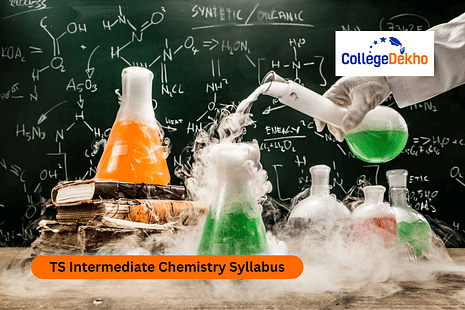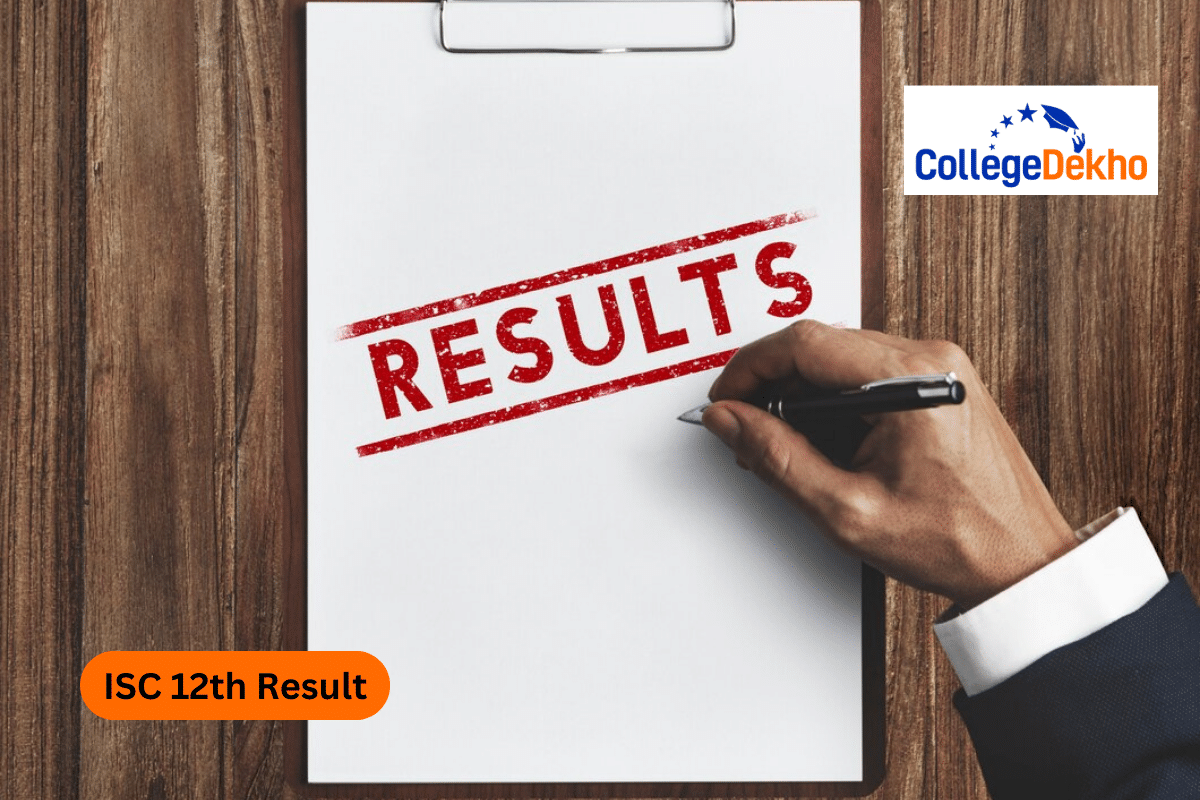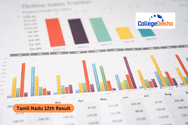TS Intermediate Chemistry Syllabus 2025 will be available on the official website of the Telangana State Board. Check out the detailed 12th class Chemistry syllabus 2025 along with the marking scheme here and get ready for the exam.


Never Miss an Exam Update
TS Intermediate Chemistry Syllabus 2025 : The Telangana State Board of Intermediate Education (TSBIE) will release the TS Inter 2nd year Chemistry syllabus 2025 on the official website at tsbie.cgg.gov.in. Meanwhile, students can check out the previous year TS Intermediate Chemistry Syllabus to start the preparation for the final exam. Students must also check the TS Intermediate Exam Pattern 2025 for Chemistry. Chemistry is a core subject apart from 3 more main subjects and 2 compulsory subjects. TS Intermediate Chemistry Syllabus 2025 comprises a total of 13 chapters, and the paper will be held for a total of 100 marks, out of which 60 marks will be based on the theory paper and 40 marks will be given for the practical exam.
The maximum time allotted for the Telangana Board 12th Chemistry exam 2025 is 3 hours, where extra 15 minutes will be provided to the students for reading the question paper. Students also have to obtain passing marks in Chemistry along with other main subjects otherwise they will not receive the passing certificates for the TS Intermediate exam 2025. The TS Intermediate time table 2025 will be released in December 2024 tentatively and the exams are expected to be conducted in February-March 2025 in pen and paper mode. The TS inter 2nd year practical exams 2025 will be conducted between February 1 and 20, 2025. To get all the information about the Telangana Intermediate Board 2025 Chemistry syllabus, read the entire article.
Also Read: TS Inter Result 2025
TS Intermediate Chemistry Syllabus 2025: Download PDF
Click on the direct link provided below to download the TS Intermediate Chemistry Syllabus.
TS Intermediate Chemistry Syllabus 2025
The table given below contains the detailed TS Inter Chemistry syllabus for the academic session 2025. Students can go through the syllabus tabulated below:
Chapters | Topics |
|---|---|
Chapter 1 Solid State | 1.1 General characteristics of solids. 1.2 Amorphous and crystalline solids. 1.3 Classification of crystalline solids 1.4 Probing the structure of solids: X-ray Crystallography 1.5 Crystal lattices and unit cells 1.6 Number of atoms in a Unit cell 1.7 Close packed structures 1.8 Packing efficiency 1.9 Calculations involving unit cell dimensions 1.10 Imperfections in solids. |
Chapter 2 Solutions | 2.1 Types of solutions 2.2 Expressing concentration of solutions 2.3 Solubility 2.4 Vapour pressure of liquid solutions 2.5 Ideal and non-ideal solutions 2.6 Colligative properties and determination of molar mass. |
Chapter 3 Electrochemistry and Chemical Kinetics Electrochemistry | 3.3 Nernst equation 3.4 Conductance of electrolytic solutions applications of Kohlrausch’slaw chemical kinetics: 3.5 Electrolysis 3.9 Rate of a chemical reaction 3.10 Factors influencing rate of a reaction 3.11 Integrated rate equations 3.12 Pseudo first order reaction 3.13 Temperature dependence of the rate of a reaction. |
Chapter 4 Surface Chemistry | 4.1 Adsorption and absorption 4.3 Colloids 4.4 Classification of colloids 4.6 Colloids Around us- application of colloids. |
Chapter 5 General principals of Metallurgy | Occurrence of Occurrence of Metals, Concentration of Ores, Extraction Extraction of Crude of Crude Metal from Concentrated Concentrated Ore, Thermodynamic Thermodynamic Principles of Principles of Principles of Metallurgy, Electrochemical Electrochemical Principles of Principles of Principles of Metallurgy, Oxidation Oxidation Reduction Reduction, Refining, Uses of Uses of Uses of Aluminium, Aluminium, Aluminium, Copper, Zinc and Iron |
Chapter 6 p-Block Elements and Group-15 Elements | 6.1 Introduction-Occurance 6.2 Dinitrogen 6.3 Compounds of nitrogen-preparation and properties of ammonia 6.4 Oxides of nitrogen 6.5 Preparation and properties of nitric acid 6.6 Phosphorous-allotropic forms GROUP-16 ELEMENTS 6.10 Introduction-Occurance 6.11 Dioxygen-preparation, properties and uses 6.12 Simple oxides 6.13 Ozone-preparation, properties, structure, uses 6.14 Sulphur-allotropic forms 6.15 Sulphur dioxide-preparation, properties, uses 6.16 Oxoacids of sulphur, 6.17 sulphuric acid properties and uses GROUP-17 ELEMENTS 6.18 Occurance-Introduction 6.19 Chlorine-preparation, properties and uses 6.20 Hydrogen chloride: preparation, properties, uses 6.21 Oxoacids of halogens 6.22 Interhalogen compounds GROUP-18 ELEMENTS 6.23 Introduction-Occurance, electronic configuration, ionization enthalpy, atomic radii electron gain enthalpy, physical and chemical properties. |
Chapter 7 d and f Block Elements & Coordination Compounds | 7.1 Position in the periodic table 7.2 Electronic configuration of the d-block elements 7.3 General properties of the transition elements 7.8 Werner’s theory of coordination compounds 7.9 Definitions of some terms used in coordination compounds 7.10 Nomenclature of coordination compounds 7.11 Isomerism in coordination compounds 7.12 Bonding in coordination compounds 7.13 Bonding in metal carbonyls 7.14 Stability of coordination compounds 7.15 Importance and applications of coordination compounds. |
Chapter 8 Polymers | Classification of Polymers, Types of Types ofTypes of Polymerisation Reactions, |
Chapter 9 Biomolecules | 9.1 Carbohydrates: Classification of carbohydrates, mono saccharides 9.2 Amino acids and Proteins. 9.5 Nucleic acids |
Chapter 10 Chemistry in Everyday Life | Drugs and their Classification, Drug-Target Interaction, Chemicals in Food, Cleansing Agents |
Chapter 11 Halo alkanes and Halo arenes | 11.1 Classification and nomenclature 11.2 Nature of C-X bond 11.3 Methods of preparation : alkyl and aryl halides 11.4 Physical properties of alkyl and arylhlides 11.5 Chemical reactions of alkyl and aryl halides. |
Chapter 12 Organic compounds containing C,H AND O | (Alcohols, Phenols, Ethers, Aldehydes, Ketones and Carboxylic acids)Alcohols, Phenols and Ethers 12.1 Alcohols, phenols and ethers- classification 12.2 Nomenclature of alcohols, phenols and ethers 12.3 Structures of hydroxyl ,ether functional groups 12.4 Methods of preparation of alcohols, phenols 12.5 Physical properties of alcohols and phenols 12.6 Chemical reactions of alcohols and phenol 12.8 Ethers–Methods of preparation, physical properties and Chemical reactions Aldehydes and Ketones 12.9 Nomenclature and structure of carbonyl group 12.10Preparation of aldehydes and ketones 12.11Physical properties of aldehydes and ketones 12.12 Chemical reactions of aldehydes and ketones 12.13 Uses of aldehydes and ketones Carboxylic Acids 12.14 Nomenclature and structure of carboxyl group 12.15 Methods of preparation of carboxylic acids 12.16 Physical properties of carboxylic acids 12.17 Chemical reactions of carboxylic acids 12.18 Uses of carboxylic acids. |
Chapter 13 Organic compounds containing Nitrogen | Amines 13.1 Structure of amines 13.2 Classification 13.3 Nomenclature 13.4 Preparation of amines 13.5 Physical properties of amines 13.6 Chemical reactions of amines. |
TS Intermediate Chemistry Exam Pattern 2025
Students can go through the chapter wise marks weightage of TS Intermediate Chemistry based on the previous year's marking scheme:Chapters | Maks Weightage |
|---|---|
Chapter 1 Solid State | 11 |
Chapter 2 Solutions | 14 |
Chapter 3 Electrochemistry and Chemical Kinetics Electrochemistry | 13 |
Chapter 4 Surface Chemistry | 08 |
Chapter 5 General principals of Metallurgy | 08 |
Chapter 6 p-Block Elements and Group-15 Elements | 23 |
Chapter 7 d and f Block Elements & Coordination Compounds | 15 |
Chapter 8 Polymers | 06 |
Chapter 9 Biomolecules | 08 |
Chapter 10 Chemistry in Everyday Life | 06 |
Chapter 11 Halo alkanes and Halo arenes | 10 |
Chapter 12 Organic compounds containing C,H AND O | 14 |
Chapter 13 Organic compounds containing Nitrogen | 06 |
TS Intermediate Chemistry Practical Syllabus 2025
The TSBIE will conduct the TS Intermediate Chemistry Practical exam 2025 for 40 marks. Students need to get at laest 35% marks in the practical paper along with the theory exam to pass the exam. The Telangana Intermediate Chemistry Practical Syllabus 2025 is listed below:- Qualitative analysis Determination of one cation and one anion in a given salt. Cation : Pb2+, Cu2+, Al3+, Fe2+, Mn2+, Zn2+, Cu2+, Ni2+, Ca2+, Sr2+, Ba2+, Mg2+, NH4+Anions: (CO3)2, (SO4)2-, Cl-, Br-, CH3COO-,NO3 - (Note: Insoluble salts excluded)
- Volumetric analysis (Titrimetry) II.a. Determination of concentration/ molarity of KMnO4 solution by titrating it against a standard Ferrous Ammonium Sulphate solution II.b. Determination of concentration/ molarity of KMnO4 solution by titrating it against a standard Oxalic acid solution II.c. Determination of concentration/ molarity of HCL solution by titrating it against a standard Sodium Carbonate solution II.d. Determination of concentration/ molarity of NaOH solution by titrating it against a standard Oxalic acid solution
- III.a. Tests for the functional groups present in organic compounds: Unsaturation, alcoholic, phenolic, aldehydic, ketonic, carboxylic and amino (Primary) groups. III.d Characteristic tests of carbohydrates, and proteins in pure samples and their detection in given food stuffs.
TS Intermediate Chemistry Project 2025
- Scientific investigations involving laboratory testing and collecting information from other sources A few suggested Projects.
- Study of the presence of oxalate ions in guava fruit at different stages of ripening.
- Study of quantity of casein present in different samples of milk.
- Preparation of soybean milk and its comparison with the natural milk with respect to curd formation, effect of temperature, etc.
- Study of the effect of Potassium Bisulphate as food preservative under various conditions (temperature, concentration, time, etc.)
- Study of digestion of starch by salivary amylase and effect of pH and temperature onit.
- Comparative study of the rate of fermentation of following materials: wheat flour, gram flour, potato juice, carrot juice, etc.
- Extraction of essential oils present in Saunf (aniseed), Ajwain (carum), Illaichi(cardamom).
- Study of common food adulterants in fat, oil, butter, sugar, turmeric power, chilli powder and pepper.
TS Intermediate Chemistry Question Paper Pattern 2025
The TS Intermediate Chemistry Question Paper will consist of 21 questions in total including objectives, short answer type, and long answer type questions. Below given is the question paper pattern of TS Intermediate Chemistry exam 2025:| Sections | No. of Questions | Marks |
|---|---|---|
| Section A | All 10 questions are compulsory | 10 X 2 = 20 |
| Section B | Any 6 questions | 6 X 4 = 24 |
| Section C | Any 2 questions | 2 X 8 = 16 |
| Total | 60 Marks |
How to Download TS Intermediate Chemistry Syllabus 2025?
The Telangana Board publishes the TS Inter Chemistry syllabus on its official website. Follow the below-mentioned steps to download the Telangana Intermediate Chemistry Syllabus 2025 PDF from the official website:
- Step 1: Students will have to go to the official website of the Telangana Board at tsbie.cgg.gov.in
- Step 2: Click on 'TS 12th Class Syllabus 2025', on the homepage's top right corner.
- Step 3: The subject-wise TS intermediate syllabus 2025 pdf will be displayed on your screen.
- Step 4: Download the TS Inter Chemistry syllabus 2025 file and save it for future preparation.
Students prepping for the Class 12 exam in 2025 must complete the TS Intermediate syllabus 2025 beforehand and start practicing the sample papers and the previous year's question papers.
FAQs
You can access the TS Intermediate Chemistry Syllabus 2024-25 from the official website of TSBIE at tsbie.cgg.gov.in. You can also find the syllabus from this page.
TS Intermediate Chemistry Syllabus 2024-25 comprises a total of 13 chapters. These chapters are further divided into topics.
Not yet, the Telangana Board will soon release the TS Intermediate Chemistry Syllabus for the academic session 2024-25 along with the blueprint.
Was this article helpful?

























